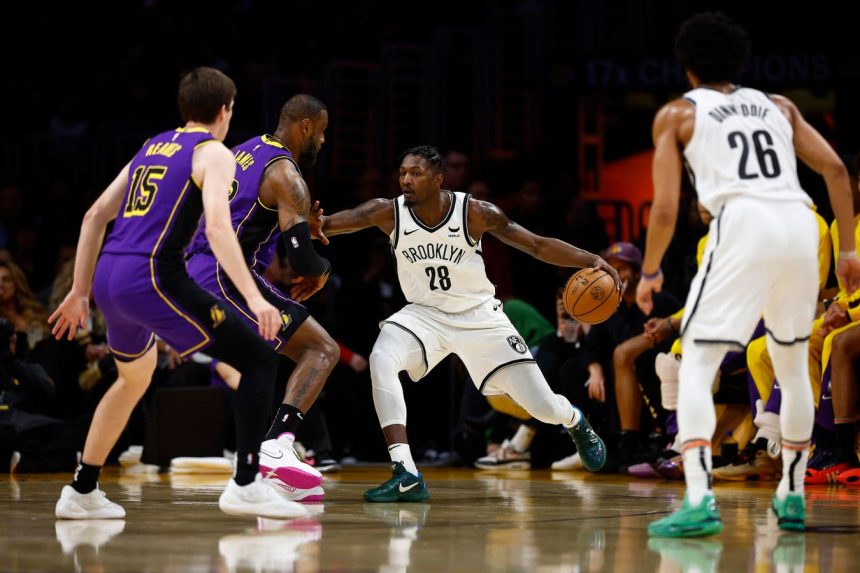The recent trade between the Los Angeles Lakers and the Brooklyn Nets, involving D’Angelo Russell, Dorian Finney-Smith, and a collection of draft picks, has shed light on the evolving dynamics of the NBA trade market under the new collective bargaining agreement. The Lakers, eager to bolster their roster for a championship push while LeBron James remains a dominant force, acquired Finney-Smith and Shake Milton for Russell, Maxwell Lewis, and three future second-round picks. While the Lakers’ pursuit of win-now talent was predictable, the trade’s details offer valuable insights into the increasing value of first-round picks and the potential reluctance of teams to part with them.
The Memphis Grizzlies’ involvement, or lack thereof, further underscores this trend. Initially considered frontrunners for Finney-Smith, the Grizzlies reportedly balked at the Nets’ asking price of a first-round pick, preferring to offer a package centered around John Konchar, Luke Kennard, and potentially a protected first-round pick. The Lakers ultimately outmaneuvered them by offering three unprotected second-round picks, albeit ones that will convey after James’ likely retirement. The Nets’ acceptance of this offer, despite their initial desire for a first-round pick, suggests a shift in their strategy, potentially influenced by the new CBA and the risk of losing Finney-Smith for nothing in free agency.
This trade echoes a broader pattern in the league. Several other rotation players have been traded for multiple second-round picks rather than a single first-rounder, including Buddy Hield and Royce O’Neale last season. The Chicago Bulls’ unsuccessful attempt to secure three second-round picks for Andre Drummond last season serves as a cautionary tale for teams seeking draft capital for expiring contracts or players with upcoming player options. The Nets, perhaps learning from the Bulls’ experience, opted for the certainty of six second-round picks over the potential of losing Finney-Smith for nothing.
The new CBA appears to be a significant driver of this trend. The stricter restrictions on high-spending teams limit their flexibility in acquiring talent through trades and free agency. Consequently, the cost-controlled contracts of rookie-scale players, particularly those selected in the first round, have become even more desirable. This increased value of first-round picks makes teams more hesitant to trade them, especially for players who aren’t considered franchise cornerstones.
Furthermore, the new CBA has also enhanced the value of second-round picks by introducing a new exception that allows teams to sign second-rounders to multi-year contracts without using cap space or exceptions. This makes second-round picks more attractive assets in trades, potentially influencing teams to accept multiple second-rounders instead of a single first-rounder. This shift in valuation could reshape the trade landscape, with teams potentially prioritizing accumulating second-round picks to build depth and flexibility.
The scarcity of first-round picks being traded outside of blockbuster deals for star players further emphasizes their increasing value. The Knicks’ trade for Mikal Bridges, which involved five first-round picks, stands in stark contrast to their acquisition of Karl-Anthony Towns without surrendering a single first-round pick. This discrepancy highlights the importance of contract value in trade negotiations, with teams more willing to invest heavily in players on team-friendly deals. The Mavericks’ aggressive trades last season, which included first-round picks for P.J. Washington and Daniel Gafford, might inspire other teams to pursue similar strategies, but the presence of a generational talent like Luka Dončić played a crucial role in their success.
The Lakers’ and Warriors’ reluctance to part with their distant future first-round picks reflects the prevailing trend of prioritizing future flexibility. Many contending teams have already traded away multiple first-round picks, limiting their ability to make significant moves at the deadline. The Suns, Bucks, Timberwolves, and Knicks, among others, have limited draft capital available for trades, which could create a bottleneck in the market for teams seeking first-round picks. Teams like the Thunder, Rockets, and Spurs, who are accumulating future first-round picks, are unlikely to be active sellers at the deadline, further constricting the market.
The Nets’ and Blazers’ reported asking prices of multiple first-round picks for Cam Johnson and Jerami Grant, respectively, will likely test the market’s willingness to meet such demands. Similarly, the Wizards, who are expected to be sellers, may struggle to secure a first-round pick for veterans like Kyle Kuzma, Jonas Valančiūnas, or Malcolm Brogdon. Ultimately, the Finney-Smith trade could be a harbinger of a trade deadline where sellers struggle to obtain the desired draft compensation, particularly in terms of first-round picks. The increasing value of first-round picks, coupled with the new CBA’s restrictions and the scarcity of available picks, is reshaping the trade landscape, making it more challenging for teams to make impactful moves.



